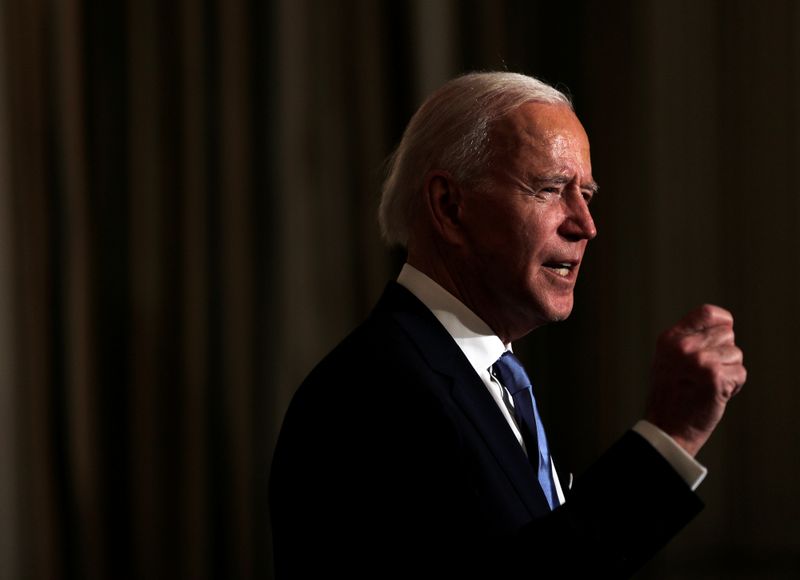By Lawrence Hurley
WASHINGTON (Reuters) - President Joe Biden in his short time in office already has turned the page on some major legal battles that consumed former President Donald Trump's administration while also taking actions certain to ignite new ones likely headed toward the U.S. Supreme Court.
The Democratic president, sworn in on Wednesday, quickly signed a flurry of executive orders that wound down some of his Republican predecessor's actions or set new priorities for his administration on issues ensnared in legal disputes such as immigration, the U.S.-Mexican border wall and LGBT rights.
Much as Trump overturned many of his Democratic predecessor Barack Obama's policies, Biden has begun to do the same to Trump's actions.
"As all the Trump administration's reversals of Obama policies generated litigation, the shift back to a Democratic president will too," said John Elwood, a Washington lawyer who argues cases at the Supreme Court, which has 6-3 conservative majority that includes three justices appointed by Trump.
Biden ended Trump's travel ban on people entering the United States from 13 countries, most of which are Muslim-majority, a policy that the court upheld in 2018 as a legitimate exercise of presidential power after a vigorous legal fight.
Biden also terminated Trump's intention to exclude immigrants who live in the United States illegally from the 2020 census count, a plan that critics said was intended to cost Democratic-leaning states seats in the U.S. House of Representatives to the benefit of Republicans. The justices in December threw out litigation challenging Trump's plan, but his administration missed deadlines and failed to put the policy in place.
Some of Biden's executive actions are sure to prompt fresh court battles or reignite existing ones including orders bolstering LGBT rights and buttressing a program that the Supreme Court blocked Trump from rescinding that protects hundreds of thousands of immigrants dubbed "Dreamers" who had lived in the United States illegally after entering the country as children.
On both issues, the Supreme Court is likely to have the final say absent the passage of legislation by Congress that cements the policies into law.
'A MAJOR CHECK'
Republican-led states and conservative advocacy groups are poised to pursue legal challenges.
"I will fight against the many unconstitutional and illegal actions that the new administration will take, challenge federal overreach that infringes on Texans' rights, and serve as a major check against the administration's lawlessness," Texas Attorney General Ken Paxton, a Republican, wrote on Twitter soon after Biden's inauguration.
Last June, the Supreme Court in a 6-3 ruling found that a federal law that bars sex discrimination in employment protects gay and transgender people. The ruling left open the question of whether other federal laws that bar sex discrimination, including in education, also protect LGBT people.
Trump's administration had argued that LGBT people were not included within the definition of sex discrimination. Biden's executive order made it clear his administration is steering a new course.
Alliance Defending Freedom, a conservative Christian group that has challenged similar policies, criticized Biden's order, in particular as it applied to transgender people.
"As federal agencies begin to implement the order, Alliance Defending Freedom will keep watch and is prepared to file lawsuits if necessary to protect our constitutional freedoms," said Jeremy Tedesco, a lawyer with the group.
The Supreme Court last June decided that Trump's plan to end the Deferred Action for Childhood Arrivals (DACA) program - which protects eligible Dreamers from deportation and provides them work permits - ran afoul of a federal law called the Administrative Procedure Act.
But the court has never ruled on whether DACA itself, which Obama created by executive action in 2012 after bypassing Congress, represented a lawful exercise of presidential power. Three of the Supreme Court's conservative justices have deemed DACA "substantively unlawful" and a challenge brought by Paxton is pending in federal court in Texas.
Biden's executive actions could also make some existing cases at the Supreme Court vanish. In one order, Biden stopped construction of the border wall, one of Trump's signature projects. The justices are scheduled to hear arguments on Feb. 22 on whether Trump overstepped his constitutional powers by diverting military funds to pay for the wall.
Biden is also seeking to end Trump's "remain in Mexico" policy that barred thousands of migrants at the U.S.-Mexican border from entering the United States while their asylum claims were being assessed. The justices are due to hear litigation over the matter on March 1 but could end up dismissing it in light of the policy reversal.
"Courts know that a change of administration often means a change in policy and don't want to decide things unnecessarily," said Jonathan Adler, a professor at Case Western Reserve University School of Law in Cleveland.

The Supreme Court is also weighing whether to hear appeals launched by Trump of lower court rulings against his regulation that barred immigrants deemed likely to require government benefits from obtaining legal permanent U.S. residency. Biden's Justice Department could withdraw those appeals, leaving the rulings against the policy in place.
